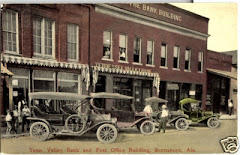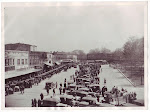Riverside Church is in the old Rec-Com building, City of Scottsboro, beside the Scottsboro Police Station. Google Earth Street Photo, Fair Use for non-profit news and commentary. In March 2011 the city council approved the new roof and air unit. The congregation began holding services in the building in 2008.
The (partial) History of the Separation of Church and State by Barbara A.Simon, Esquire (Fair Use for non-profit news reporting and commentary)
"First coined by the 17th century Baptist leader Roger Williams who, in 1636, founded Rhode Island, the phrase "separation of church and state" was used by both Thomas Jefferson and James Madison (the father of the Constitution), to describe the meaning of the Constitution's religion clauses. The religion clauses provide for the "free exercise" of religion and prohibit the government from "establishing" religion by favoring one religion over another or favoring religion over non-religion. The U.S. Supreme Court, the ultimate arbiter of the Constitution's meaning, first utilized the phrase in the 1878 case of Reynolds v. United States, stating that Jefferson's term 'wall of separation between church and state' "may be accepted almost as an authoritative declaration of the scope and effect of the [First] Amendment.""
"The Court has repeatedly held that "separation of church and state" is the constitutional cornerstone of religious liberty. In the 1947 case of Everson v. Board of Education, Justice Hugo Black, in writing for the majority, stated: "In the words of Jefferson, the clause against establishment of religion was intended to erect a wall of separation between church and state." In defining what is meant by the establishment of religion, Justice Black wrote, "Neither a state nor the Federal Government can set up a church. Neither can pass laws which aid one religion, aid all religions, or prefer one religion over another.... No tax in any amount, large or small, can be levied to support any religious activities or institutions, whatever they may be called, or whatever form they may adopt to teach or practice religion.... The First Amendment has erected a wall of separation between church and state. That wall must be kept high and impregnable. We could not approve the slightest breach.""
Graphic by warofroses146.wordpress.com Fair Use for non-profit news reporting and commentary.
“It will be the Government’s care to maintain honest co-operation between Church and State; the struggle against materialistic views and for a real national community is just as much in the interest of the German nation as in that of the welfare of our Christian faith. “- Adolf Hitler, speech to the Reichstag 23 March 1933
August 3, 2016 - City of
Scottsboro Property Management Issue – Clouding the Separation of Church and
State by Scottsboro City Government
James Madison denounced
government attempts to spend even “three pence” of our taxes for religious
purposes. And Thomas Jefferson stood up against the “sinful and tyrannical” act
of forcing taxpayers to fund any religion (even their own) against their will.
A lot has changed since then, but not this longstanding First Amendment
principle. The separation of church and state protects against advancing
religion with taxpayer dollars.
Riverside Church (the old
Rec-Com building) – The church at its current location, according to church
officials, has been holding worship services there since 2008. In March of 2011
the City Council of Scottsboro, Al. approved a $65,000 expenditure for a metal
roof and air conditioning for the church. The lease was recently extended in May of 2016 for 10
years at the same monthly cost of $250.00, payable to the City of Scottsboro.
Compare that with the $3000 per month the City of Scottsboro charges the
Scottsboro Municipal Court for it’s so called lease (according to the
Scottsboro Magistrate’s Office).
Alabama Constitution,
Article 1, Section 3
“That no religion shall be
established by law; that no preference shall be given by law to any religious
sect, society, denomination, or mode of worship; that no one shall be compelled
by law to attend any place of worship; nor to pay any tithes, taxes, or other
rate for building or repairing any place of worship, or for maintaining any
minister or ministry; that no religious test shall be required as a
qualification to any office or public trust under this state; and that the
civil rights, privileges, and capacities of any citizen shall not be in any
manner affected by his religious principles.”
In March 2011 the City
Council of Scottsboro, Alabama approved replacing a roof and air-conditioning
unit for the Riverside Church, property owned by the City of Scottsboro and
leased to the church for a small amount of money. “…that no one shall be
compelled by law to…pay…for repairing any place of worship.” Excerpt from the
Alabama Constitution, Article 1, Section 3.
Constitution of the United
States, Article 1, Establishment Clause
The First Amendment's
Establishment Clause prohibits the government from making any law “respecting
an establishment of religion.” This clause not only forbids the government from
establishing an official religion, but also prohibits government actions that
unduly favor one religion over another. It also prohibits the government from
unduly preferring religion over non-religion, or non-religion over religion.
(ACLU position)
The Lemon Test (Supreme
Court of the U.S. in Lemon vs Kurtzman)
Government action violates
the Establishment Clause unless it:
1. Has a significant
secular (i.e., non-religious) purpose,
2. Does not have the
primary effect of advancing or inhibiting religion, and
3. Does not foster
excessive entanglement between government and religion.
(Not all justices agree
with every aspect of this test. However, it is the prevailing test of whether
there is a violation of the Establishment Clause of the Constitution.)
Will you allow only
specific religious worship on government property? Will you say only those
religious bodies who are approved by the State or Federal Government may lease
city property or conduct religious services on city government property based
on IRS status? You as a government entity are utilizing the Federal government
as a determination whether you will allow specific religious entities to
worship on city government property in violation of the Establishment Clause of
the First Amendment.
Religions Other Than
Christianity
The American Indian
Religious Freedom Act, Public Law No. 95-341, 92 Stat. 469 (Aug. 11, 1978)
(commonly abbreviated to AIRFA), codified at 42 U.S.C. § 1996, is a United
States federal law, enacted by joint resolution of the Congress in 1978. Native
American Religions were up to this point prohibited by law. [1]
It was enacted to return basic
civil liberties, and to protect and preserve the traditional religious rights
and cultural practices of American Indians, Eskimos, Aleuts, and Native
Hawaiians. [2] These rights include, but are not limited to, access to sacred
sites, freedom to worship through ceremonial and traditional rights, and use
and possession of objects considered sacred.
The Act required policies
of all governmental agencies to eliminate interference with the free exercise
of Native American religion, based on the First Amendment, and to accommodate
access to and use of religious sites to the extent that the use is practicable
and is not inconsistent with an agency's essential functions.[3] It also
acknowledges the prior violation of that right.[4]
1.
Powell, Jay;
& Jensen, Vickie. (1976). Quileute: An introduction to the Indians of La
Push. Seattle: University of Washington Press. (Cited in Bright 1984).
2.
Cornell.edu.
"AIRFA act 1978.". Archived from the original on 19 June 2006.
Retrieved July 29, 2006.
3.
United States (2013). Indian Sacred Sites:
Balancing Protection Issues with Federal Management. America in the 21st
century : political and economic issues. Christopher N. Griffiths (ed.). New
York: Nova Science Publishers, Inc. ISBN 1628082844.
4.
Canby, John C.
Jr. American Indian Law in A Nutshell. West Publishing Company, 1988. Pg. 339,
340.
Native American Religions
other than Christianity - Earth Lodge Religion; Ghost Dance; Indian Shaker
Religion; Longhouse Religion; Mexicayotl; Native American Church; Waashat
Religion.
Will you allow Jewish, Buddhists,
Hindu’s, Islam-Muslim, Taoists, Bantuists, Berber, Serer, Santeria, Candomble,
Vodou, Orisha, Atheists, Deists, Church
of Satan or what some may consider extremist religious groups, KKK or Jihadists
to lease city property for religious reasons. Will you allow religious
sacrificial worship on city property?
Summary
City Government becoming
entangled in the lease of city property to a church for religious worship
clouds the Wall of Separation between Church and State, Establishment Clause of
the United States Constitution. Repairing Riverside, or any Church, with tax
payer funds, authorized by city council in March of 2011 appears to violate the
Alabama Constitution, Article 1, Section 3 in that “……that no one shall be
compelled by law to…pay…for repairing any place of worship.”
Furnishing a church city
property to conduct worship surfaces via a lease or any other means is wrong,
The March 2011 repairs on the church was wrong. The citizens of Scottsboro
Alabama are compelled by law to fund repairs and allow government officials to
thumb their nose at the Constitution of the State of Alabama and the United
States of America to fulfill their personal ideologies regarding the involvement
of government in the business of religious worship, that is wrongful behavior
The historical mismanagement
of city property and the blatant failure to follow the laws of the State of
Alabama in regards to the management of city property is not good governance
nor sensible behavior. The willful, flagrant continuing violation of the
Constitution of the State of Alabama and the United States of America regarding
the separation of church and state moves the leadership of the City of
Scottsboro into another realm, that of a government for a few misguided souls embellishing
theocracy not the Republic. City Council, you are on dangerous ground where legal
action could cost the citizenry of Scottsboro, Alabama dearly. Placing your
personal values ahead of good governance and law is the way of foolish,
irresponsible behavior.
Face Book link to article with replies : https://www.facebook.com/garry.l.morgan.5/posts/10210161727583388?comment_id=10210161815305581
Face Book link to article with replies : https://www.facebook.com/garry.l.morgan.5/posts/10210161727583388?comment_id=10210161815305581
















1 comment:
Strong argument...
Post a Comment